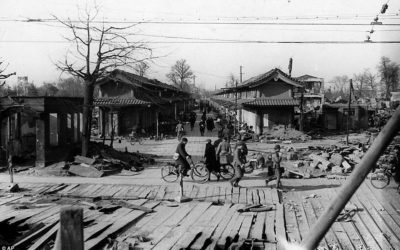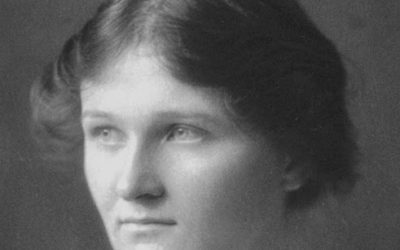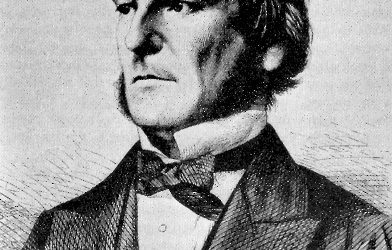When we discuss the various kinds of adversity that our Achievers have had to overcome in their lives, we run the risk of overlooking one considerable advantage that many of them had in common: that of living in a society where individual rights were respected and free enterprise allowed. Though many were poor, they knew that if they earned money they would be able to keep it; though many were discriminated against because of private prejudice, most of them could trust the government and the law to remain impartial. It’s important for us to remember that in many times and places people have had to endure the trials of life without this protection. Today’s subject, though her achievements made her unique, faced the same kind of adversity as countless others in her efforts to stand against a hostile, repressive totalitarian state.
Anna Andreyevna Gorenko was born on June 23, 1889 near Odessa in modern-day Ukraine. Her family was wealthy and comfortable by the standards of the day; both of her parents were descendants of Russian nobility, and her father was a prosperous naval engineer. Anna was able to spend her childhood studying and writing, and by her late teens she was a published poet, although her father’s disapproval forced her to write under a pen name: Anna Akhmatova. In 1910, she married a fellow poet, Nikolay Gumilev, and though their marriage was unstable from the beginning her love of poetry was undimmed. Two books of poems published in the early 1910s established her as a leading Russian poet, and she formed close friendships with many writers and intellectuals, including the novelist Boris Pasternak.
However, the literary career she was just beginning to build up would soon come crashing down around her. In 1917, after three years of war that had brought Russian society to a state of near-chaos, the Tsarist regime collapsed, and the Bolsheviks under Lenin seized the opportunity to assert control over the entire Russian empire. Many intellectuals, including some of Akhmatova’s closest friends, chose to emigrate rather than face the harsh realities of the new government. Akhmatova, however, had nothing but contempt for this decision. To her, abandoning one’s native land out of fear was an act of betrayal, and so she stayed behind in an atmosphere that was rapidly turning hostile to people like her.
The new Bolshevik government, wary of counter-revolutionary activity, was obsessive in its efforts to ferret out subversion, particularly among the intelligentsia. In 1921 a trumped-up charge of conspiracy against the state led to dozens of intellectuals being shot without trial, including Nikolay Gumilev. Although Akhmatova had divorced him three years before, she and her son Lev were still under suspicion as his relatives. Furthermore, the new regime disapproved of Akhmatova’s poetry, seeing it as “bourgeois”, selfish and insufficiently Marxist in character. Having been identified as an ideological enemy of the state, she would remain for the rest of her life a target for censorship, scrutiny of her private life, and the constant threat of imprisonment.
Akhmatova resolutely continued to write in spite of both this official persecution and her own steadily deteriorating finances. At the same time, she witnessed those around her being subjected to the same brutal treatment that one day awaited her if she spoke too freely. Her son was refused access to higher education and imprisoned multiple times for alleged anti-state activities. Friends like Osip Mandelstam and Nikolay Punin were arrested in Stalin’s frequent political purges and shipped off to forced-labor camps, where most would remain for the rest of their lives. These tragic experiences informed the creation of one of her greatest works, the poetry cycle Requiem, which chronicled the sufferings of the Russian people under Stalin’s purges. Requiem was such a bitter statement about life in Stalinist Russia that even during the so-called “Khrushchev Thaw” it could not safely be published; it was not until 1987, close to the end of the Soviet system, that the entire work appeared in printed form within Russia.
Akhmatova’s profile in the West, however, continued to grow, and with the end of the Stalinist regime in 1953 her poems and translations became more widely known in Russia as well. In a Soviet Union now more concerned about its global image, and in which few great intellectual figures from previous decades remained, she was an admired icon of resistance to authority and intellectual courage. Many poets of the younger generation that had grown up under Communism looked to her as a mentor, including future Nobel Prize winner and U.S. Poet Laureate Joseph Brodsky. By the time of her death in 1966, she was considered one of the world’s leading women of letters.
Anna Akhmatova was a woman who believed in facing up to life’s greatest challenges. Faced with the prospect of losing everything in the Bolshevik revolution, she stayed in the country she loved rather than flee and leave it to its fate. In the midst of oppression and danger, she spoke for the countless people ground down by the totalitarian Stalinist regime, people who were unable to speak for themselves. To do these things requires a degree of bravery far above the ordinary. There are few of us who could be certain that we would choose such hardship in the face of temptations to conform to or leave the society in which we live, and many of us are fortunate in not having to make that choice.
The philosopher Isaiah Berlin visited Akhmatova in 1945, during the height of official condemnation of her work, and was impressed by both the dignity of his hostess and the austerity of her surroundings. In later years, he had this to say about the impression she left on the world around her:
“The widespread worship of her memory in the Soviet Union today, both as an artist and as an unsurrendering human being, has, so far as I know, no parallel. The legend of her life and unyielding passive resistance to what she regarded as unworthy of her country and herself transformed her into a figure (as Belinsky once predicted about Herzen) not merely in Russian literature, but in Russian history in our century.”
Next Post: Harvey Kurtzman, the cartoonist whose early life was far from comical, but who ultimately made the world laugh with Mad magazine.














